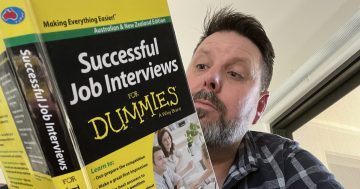Alison Green says it’s important to ask questions at a job interview to both impress your potential employer and get useful insights into whether this is the right job for you.
By Alison Green*

Photo: Charles Deluvio
As someone who has interviewed probably thousands of job candidates in my career, I’ve long been surprised by how many people don’t ask good questions when their interviewer gives them the opportunity.
A surprising number of candidates don’t have many questions at all.
But people understandably worry about what to ask.
They stress about seeming demanding or nitpicky, or that they’ll be negatively judged for things they want to know.
So here are the five best questions to ask a job interviewer — to both impress your potential employer and help you get useful insights into whether this is the right job for you.
- “How will you measure the success of the person in this position?”
This gets right to the crux of what you need to know about the job: what does it mean to do well, and what will you need to achieve for the manager to be happy with your performance?
Organisations often post job descriptions that primarily use boilerplate language from HR, while the actual manager has very different ideas about what’s most important in the role.
Also, frankly, most employers just suck at writing job descriptions, so it’s useful to have a real conversation about what the role is really about.
You might find out that while the job posting listed 12 different responsibilities, your success really just hinges on two of them, or that the posting dramatically understated the importance of one of them.
- “What are some of the challenges you expect the person in this position to face?”
This can get at information you’d never get from the job description — like that you’ll have to deal with messy interdepartmental politics, or that you’ll need to work within draconian budget restrictions on your program.
It can also create an opening for you to talk about how you’ve approached similar challenges in the past, which can be reassuring to your interviewer.
I don’t recommend asking questions just so you can follow up with a sales pitch for yourself — that’s annoying and usually pretty transparent — but if asking about challenges leads to a real discussion of how you’d approach them, it can be genuinely useful for you both.
- “Thinking back to people you’ve seen do this work previously, what differentiated the ones who were good from the ones who were really great at it?”
A job candidate asked me this question years ago, and it might be the strongest question I’ve ever been asked in an interview.
It goes straight to the heart of what the hiring manager is looking for.
Hiring managers aren’t interviewing candidates in the hopes of finding someone who will do an average job; they’re hoping to find someone who will excel at the job.
And this question says that you care about the same thing.
Sure, it doesn’t guarantee that you’ll do extraordinary work, but it makes you sound like someone who’s at least aiming for that.
Plus, the answer to this question can give you much more nuanced insight into what it’ll take to truly excel in the job.
- Ask the question you really care about.
Sometimes people use their turn to ask questions in an interview solely as an additional chance to try to impress their interviewer — asking questions designed to reflect well on them rather than questions designed to help them figure out if the job is right for them in the first place.
It’s understandable to want to impress your interviewer, but interviewing is a two-way street — you need to be assessing the job and the employer and the manager, and figuring out whether this is a job you want and would do well in.
So before you interview, spend some time thinking about what you really want to know.
When you imagine going to work at the job every day, what are the things that will most impact whether you’re happy with the work, with the culture, with the manager?
Maybe it’s important to you to work in an informal culture with heavy collaboration.
Maybe you care most about working somewhere with sane hours, where calls and texts on the weekend or in the evenings are rare.
Of course, you shouldn’t rely only on your interviewer’s answers about these things.
You should also do due diligence by talking to people in your network who might have the inside scoop on the organisation’s culture or the manager you’d be working for, reading online reviews at places like Glassdoor, and talking to other people who work there.
- “What’s your timeline for next steps?”
This is a basic logistics question, but it’s useful to ask because it gives you a benchmark for when you can expect to hear something back.
Otherwise, if you’re like many people, in a few days you’re likely to start agonising about whether you should have heard back about the job by now.
Plus, asking this question makes it easy for you to check in with the employer if the timeline they give you comes and goes with no word.
If they tell you they plan to make a decision in two weeks and it’s been three weeks, you can reasonably email them and say something like, “I know you were hoping to make a decision around this time, so I wanted to check in and see if you have an updated timeline you can share.”
* Alison Green is a columnist for The Cut.
This article first appeared at www.thecut.com.











